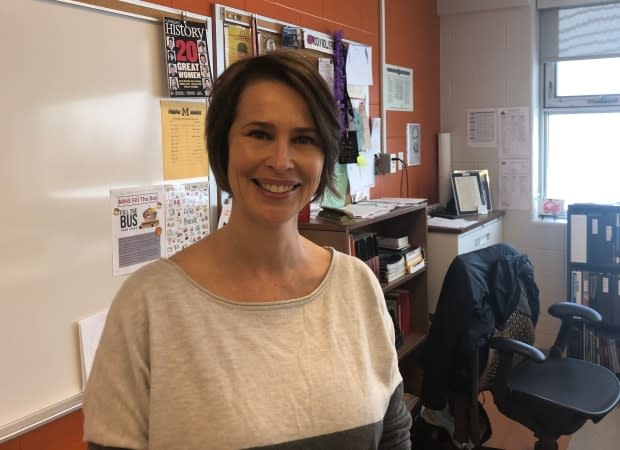'We're constantly asked for pictures': Teen researches why sending naked pics is now normal

Kiona Osowski's Grade 12 research project started with a question, based on her own experiences as a 17-year-old teenager: why are girls so often asked for nude photos?
"I think a lot of people don't want to talk about it, but it's happening," she said. "We're constantly asked for pictures or we're sent things without our consent."
Since September, Kiona has been looking more closely at why boys feel entitled to ask for nude photos, and why girls feel compelled to send them.
"This has become a societal norm and we need to start taking it apart."
In her research, she has discovered a perfect storm of media messages that she believes are "toxic" to teens who are growing up with phones in their hands 24/7.
Many of the adults in our lives are unaware of the issues going on with our youth. - Kiona Osowski, Grade 12 student
Kiona worked on her project under the supervision of psychology teacher Heather Gunn and sociology teacher Chris Evans.
"We're sort of naive as older people thinking, 'Oh, they've got this device and they're playing Minecraft,'" Gunn said. "It was an eye-opener for us. I don't understand their world and how, in many ways, they've been impacted from this new reality."
As part of her project, Kiona has rewritten New Brunswick's Grade 9 and 10 personal development curriculum and has begun presenting her research to her peers at Moncton High.
Related Video: Nude Pics Brainstorming Session
She said much of the material that's already being covered, such as internet safety and career planning is good, but it needs to be updated.
"Nude photos, media exploitation of women, toxic male gender representation and violence-inducing media, porn and so many other issues are simply not talked about," she writes in her letter to officials at the Anglophone East School District.
"Many of the adults in our lives are unaware of the issues going on with our youth."
'Why can't I look like that?'
Kiona's research started with the way she and most of her friends feel about their bodies and how they look.
"You can sit next to your best friend and you know that she's thinking the same thing — that she doesn't like herself," she said. "We're going through our Instagram and we see this skinny, tanned, blonde — this girl who only eats kale and goes to the gym every day and we think, 'Well why can't I look like that?' and 'Why can't I have that body?'"
I was like, 'Well I can hate my body because everyone else does too,' so that's why I want to make it so it's not normal. - Kiona Osowski, Grade 12 student
In her new curriculum, students would learn about the editing of photographs that happens in some media, and how girls are often left striving for an ideal that doesn't exist. It also addresses the growing number of people with eating disorders.
"I could walk up to my friend and tell her, 'I haven't eaten all day,' and she'd be like, 'Oh my God, me neither.' And that shouldn't be a conversation. The conversation is, 'I haven't eaten all day,' and then someone should say, 'You need to eat something. That's not healthy for your body.'"
Kiona plays on her school soccer team and is part of a boxing club — two activities that make her feel "strong" and "empowered."
She wishes someone had told her in middle school that feeling bad about her body was not normal.
"I just kind of went on with my life and I was like, 'Well, I can hate my body because everyone else does too,' so that's why I want to make it so it's not normal."
Boys influenced by diet of porn, video games
Kiona also looked closely at research around young men and the media.
"Guys watch a lot of movies, video games and porn … I've never seen a movie where guys walk up to each other and just hug," she said.
In media, men rarely express emotion, which Kiona said has left boys with the belief that anger is the only acceptable emotion.
"In the media, men are seen as dominant, they're seen as sexually aggressive, aggressive in general and lacking in emotions."
In her presentation, she challenges the boys in her class to allow one another to express themselves.
"Like if your friend is having a hard day — support him, don't make fun of him. Create a community where it's OK to show emotion and challenge the media stereotype that it's not."

When she brings up porn in her presentation, Kiona said it always raises some eyebrows among her peers, but she believes the way women and men are portrayed needs to be talked about.
"There's this ideal that men have that they deserve certain things … a rich man with a nice house and a beautiful woman and when men don't get that in reality, they can become really frustrated because they don't know how to experience emotion."
[Students] don't always want to hear from moms and dads and grown-ups. I think that they look to peers that they respect and they see themselves in. - Heather Gunn, MHS teacher
Gunn points to her own course material, which includes research that suggests 80 per cent of young men in Canada between the ages of 12 and 18 watch porn daily.
"I've known that, but I didn't really think deeply about the many ways that impacts boys and girls," Gunn said.
"The damaging things that are happening that society is instilling in our young kids — we've got to talk about it," Evans added.
Moncton High students to visit middle schools
Kiona hopes to present her new curriculum to members of Moncton High's parent school support committee later this month and also hopes to get an audience with officials at the Anglophone East School District.
It's the first step as she tries to change the curriculum for the entire province.
"We need to keep evolving our education. We can't just stall out and say, 'Well we're just going to go with the flow — it doesn't work that way.'"
In the new semester that begins in February, Kiona plans to work with other students and make presentations to middle school classes.
A smart generation
"[Students] don't always want to hear from moms and dads and grown-ups. I think that they look to peers that they respect and they see themselves in and they're respect Kiona and those who will be working with her," said Gunn.
The goal is to get students thinking more critically about the media messages that leave young women feeling insecure, and young men emotionally handicapped.
Kiona believes her generation is smart enough to change the script, including those constant requests for nude pictures, that's playing out in middle schools and high schools.
"Once we start challenging the views that we're being brainwashed with and that the media keeps feeding us, then we can fix the relationships with ourselves and we can fix the relationship with each other as well."

